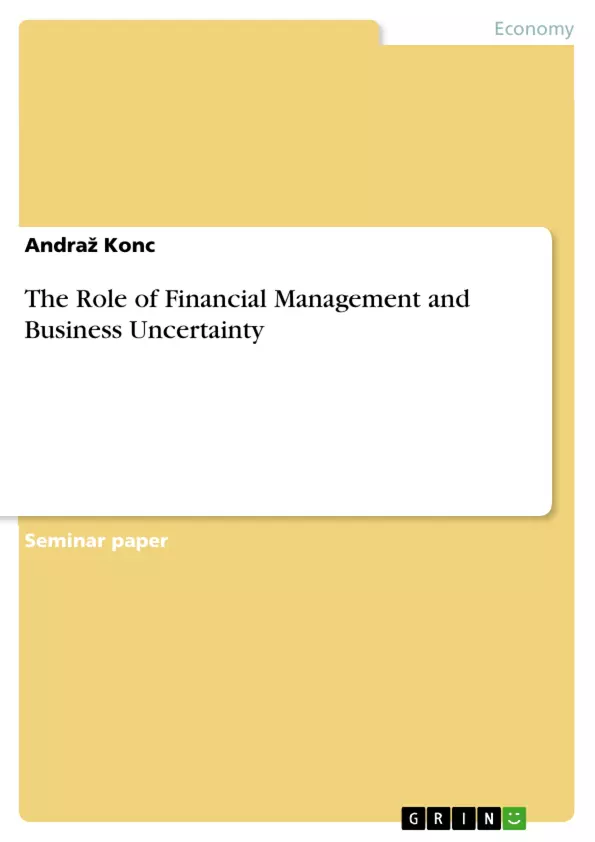Financial management plays one of the most important roles in running a successful business. It is necessary to minimise costs, maximise profits and plan or manage the financial resources of the company. In times of crisis, financial management skills are even more important. Economic uncertainty can have significant negative consequences for businesses. Economic uncertainty has been found to significantly reduce the performance of companies. Economic uncertainty worldwide has reached record levels in recent years.
I will describe the impact of economic uncertainty on companies and the financial management function. I have found that an adverse shock to economic uncertainty has a negative effect on real GDP. If we want the economy to perform well, we need to monitor economic uncertainty and respond appropriately. Management must incorporate stress-testing procedures, investments, business strategies and economic forecasts into their decision-making processes if they want to see stable and profitable business operations.
Inhaltsverzeichnis (Table of Contents)
- INTRODUCTION.
- Purpose, objectives and hypothesis
- DEFINING FINANCIAL MANAGEMENT..
- ECONOMIC UNCERTAINTY AND BENCHMARKS
- .2
- .3.
- .4
- THE IMPACT OF ECONOMIC UNCERTAINTY ON BUSINESSES
- The role of management in managing the impact of economic uncertainty
- ECONOMIC UNCERTAINTY IN THE CRISIS COVID-19........
- SHOP.
- LITERATURE AND SOURCES
Zielsetzung und Themenschwerpunkte (Objectives and Key Themes)
This thesis examines the impact of economic uncertainty on firms, focusing on the crucial role of financial management, particularly in the context of the coronavirus pandemic. It explores concepts like economic uncertainty and financial management, while addressing the limited literature on the subject in the Slovenian language. The study aims to understand how economic uncertainty affects companies and how financial management can mitigate its negative consequences.
- The impact of economic uncertainty on firms
- The role of financial management in mitigating the effects of economic uncertainty
- The impact of the COVID-19 pandemic on economic uncertainty
- The definition and measurement of economic uncertainty
- Strategies for managing economic uncertainty
Zusammenfassung der Kapitel (Chapter Summaries)
The introduction sets the stage for the thesis, outlining its purpose, objectives, and the problem it addresses. It defines economic uncertainty and discusses its implications for businesses, highlighting the role of financial management in mitigating its impact.
Chapter 2 delves into the definition of financial management, outlining its key functions and importance in running a successful business.
Chapter 3 explores the concept of economic uncertainty, presenting various benchmarks and indicators used to measure it. It examines the consequences of economic uncertainty and how financial management can limit its negative effects.
Chapter 4 discusses the impact of economic uncertainty on businesses, focusing on how companies are affected by this phenomenon and how financial management plays a critical role in managing these impacts.
Chapter 5 examines the economic uncertainty experienced during the COVID-19 pandemic, highlighting the specific challenges faced by companies during this period and how financial management adapted to address these challenges.
Schlüsselwörter (Keywords)
This thesis revolves around the key concepts of financial management and economic uncertainty, exploring their interrelationship and the impact on firms, particularly in the context of the COVID-19 crisis. It examines the impact of economic uncertainty, its measurement, and the role of financial management in mitigating its negative consequences.
Frequently Asked Questions
Why is financial management crucial during economic uncertainty?
Financial management helps minimize costs, maximize profits, and manage resources effectively to ensure business stability during crises.
How does economic uncertainty affect a country's GDP?
Research shows that adverse shocks to economic uncertainty have a significant negative effect on real GDP and overall company performance.
What was the impact of COVID-19 on business uncertainty?
The COVID-19 pandemic caused economic uncertainty to reach record levels, presenting unique challenges for financial managers worldwide.
What strategies should management use to mitigate uncertainty?
Management should incorporate stress-testing, strategic investments, and detailed economic forecasting into their decision-making processes.
Is there much literature on this topic in the Slovenian language?
The thesis notes that there is currently limited literature available on the specific impact of economic uncertainty in Slovenian.
- Citation du texte
- Andraž Konc (Auteur), 2022, The Role of Financial Management and Business Uncertainty, Munich, GRIN Verlag, https://www.grin.com/document/1385635



